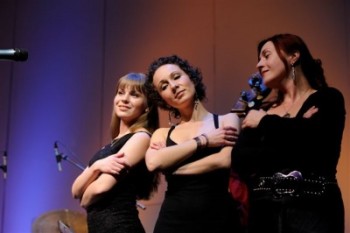 Akana-NHS (Minsk)
Akana-NHS (Minsk)
 Akana-NHS (Minsk)
Akana-NHS (Minsk)
Yesterday we touched upon the newest work from Minsk performer Rusya (above, center), who is embarking on a series of collaborations with Belarusian producers and beatmakers in order to vivify some aspects of local folklore. Tradition, she feels, is losing ground too fast to the fickle workings of contemporary media. The recent decimation of the East European music industry by piracy and economic downturn has done related, additional damage to other forms of stability. Song is now divorced from once-established centers of learning, practice, and commerce. Not to mention the vanishing act of hard media: even the tools used to archive performance have dissolved in the ether.
Bankruptcy and copyright abuse have left a wide path of destruction in their wake.
“Archetypes of a proto-Belarusian consciousness”
As we mentioned, Rusya is for most Belarusians associated with the ensemble Akana-NHS, which – in turn – is dedicated to the celebration and advocacy of “a rich, vividly ethnic strain within our true culture of song.” Authenticity is aligned with endurance from the outset; truth is a matter of persistence. Within those pre-modern texts and harmonies, allegedly, one might discover the “archetypes of a proto-Belarusian consciousness.” Prior even to political geography is an ethnically specific awareness. By implication it stands against both the homogenizing intentions of a prior empire and the deterritorialized flows of heartless commerce. It simply endures.
Sure enough, we read in some of the ensemble's manifestos that “the musical symbols [of our repertoire] are so complete and self-sufficient that time itself cannot alter them. They have remained constant for one thousand years.” As we quickly see, this conservatism, given the short attention span of modernity, takes on the role of frontline novelty: the most exciting and subversive act of all is to stand firm. Hence the ability of tradition to “interweave with jazz intonations, funk-based rhythms, and avant-garde harmonies.”
“Jazz intonations, funk-based rhythms, and avant-garde harmonies”
One is even reminded of the modish primitivism that ran through Slavic experimental art in the early twentieth century. It was felt that pre-modern (even pre-linguistic) utterances and images could bring a vital, perhaps magic hue to the dull palette of recent experience. Shallow materialism had cast a long, grey shadow over human enterprise; it could only be dispersed with the “supernatural” help of ancient praxis.
Akana-NHS first came together in 2003, when the band's members were all studying at the Glinka Music School in Minsk. Currently the lineup, which has changed little, consists of Rusya (vocals, vargan), Irena (vocals, ocarina, buben), Nadezhda Chugunova (vocals), Valerii Verenich (double bass), Pavel Klimko (saxophone), Andrei Sotnichenko (keyboards), and Egor Dzheigalo (percussion, flute). That roster shows well the dovetailing of tools old and new.
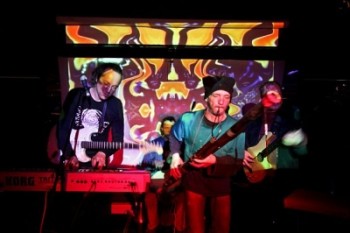 Ole Lukkoye (St. Petersburg)
Ole Lukkoye (St. Petersburg)
This association of folk custom with social change is certainly evident elsewhere. Take, for example, the St. Petersburg outfit known as Ole Lukkoye (or, in some quarters, “OL”). Formed in the early 1990s, the band was steered through its earliest years by founding member Boris Bardash. Amid the initial, happy disorder of post-Soviet music, all manner of styles were investigated, yet a primary focus would fall upon reggae, rock, jazz, and what would soon become trip-hop. All those modes were interwoven with the folk traditions of northern Russia.
As we can already see, any civic alternatives here – advocated on stage – are coming less from an activist agenda than a “drop-out” ethos.
“Music from the oldest motherland of all”
And, sure enough, phrases such as “proto-Slavic consciousness” began to be uttered in the same context as “psychedelia.” The best escape from twentieth-century pragmatism, be it from the Left or Right, was an abandonment of logic altogether. And so Ole Lukkoye went in search of “roots... a [primary] source, and the oldest motherland of all.” They romanticized some verdant, shaggy realm from a time before mapmakers began their divisive practice. Bardash himself began to work increasingly in the fields of Slavic philosophy, ethnography, and archaeology: objective data was sought in support of a gut feeling. That same synthetic enterprise leads us nowadays to claims that the band “works on many levels of the mind, be it the subconscious or through 'mere' aesthetics.”
 The titles of some recent Ole Lukkoye recordings have done much to stake out this enduring, yet
stubbornly independent agenda. Phrasing such as “Border Zone” and
“Petroglyph” highlights a deliberate avoidance of mainstream enterprise, stressing
instead some “timeless” involvement with pre-urban society. It seems so appealing to
Russian audiences that one Moscow magazine recently wrote: “If the work of Ole Lukkoye
didn't exist, somebody would have to invent their imagery – of life in some liminal realm, be it
historical or psychedelic.”
The titles of some recent Ole Lukkoye recordings have done much to stake out this enduring, yet
stubbornly independent agenda. Phrasing such as “Border Zone” and
“Petroglyph” highlights a deliberate avoidance of mainstream enterprise, stressing
instead some “timeless” involvement with pre-urban society. It seems so appealing to
Russian audiences that one Moscow magazine recently wrote: “If the work of Ole Lukkoye
didn't exist, somebody would have to invent their imagery – of life in some liminal realm, be it
historical or psychedelic.”
“Life in some peripheral territory, be it historical or psychedelic”
Once more, endurance and cultural fidelity become an extreme way of opposing modern mores. Of OL we read elsewhere: “The band's rhythmic meditations extend their roots into some archaic strata of our psyche. There's nothing in this music that smacks of modern multiculturalism, though. If we're looking for a definition of the band's melange, then it's spun from different things... [These sounds, after all, recall] the times of ancient nomadic transition... stamped upon our memory by the burial mounds of southern Russia's steppe...”
 Deti Picasso (Moscow/Yerevan)
Deti Picasso (Moscow/Yerevan)
This grand turn of phrase certainly falls into line with other outifts that are equally influential with Russia, yet call upon a different cultural background. Put differently, non-Slavic folklores are sometimes just as important for Slavic audiences. The very idea of folk tradition per se is more appealing than post-modern frippery. By way of illustration we might suggest Deti Picasso (Picasso's Children), who advertise themselves as exponents of a “dizzying, incisive sound, built on strong ethnic roots, psychedelia and a hypnotizing energy.” Those same roots are expressed most often through the use of ancient Armenian chants and traditional instrumentation.
“A dizzying, incisive sound, built on strong ethnic roots, psychedelia and a hypnotizing energy”
Psychedelia, time after time, moves to the fore. The best response to modernity continues to be escapism, illogicality, and the irrational, even absurdist nature of some timeless pantheism. Everybody runs for the hills. Atomized society inspires a radical alternative: the enlightened, yet challenging humility of some vanishing act within nature's leafy depths. It's tempting to see an overlap here with the Orthodox Christian notion of kenosis or a mental and physical “emptying” of selfhood in order to receive some higher awareness.
As the next recording suggests, however, access to natural profundity within an urban setting requires a difficult and rare viewpoint.
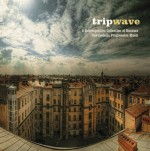 And so, in support and celebration of these ideas, the New York label Trail Records has now
released a retrospective collection entitled “Trip Wave.”
With tracks from Deti Picasso
and ten other Russian folk-rock/ psychedelic outfits, the compilation spans two decades of
experimentation – over the “border zone” between rock, rural custom, and
even time-honored modes of prog's ornateness. These compositions have been arranged
chronologically, in order to give listeners a sense of how such flights of fancy have evolved since the
end of the Soviet period. Over time, the linear workings of time itself have been shunned – in
favor of cyclical, if not idyllic motifs.
And so, in support and celebration of these ideas, the New York label Trail Records has now
released a retrospective collection entitled “Trip Wave.”
With tracks from Deti Picasso
and ten other Russian folk-rock/ psychedelic outfits, the compilation spans two decades of
experimentation – over the “border zone” between rock, rural custom, and
even time-honored modes of prog's ornateness. These compositions have been arranged
chronologically, in order to give listeners a sense of how such flights of fancy have evolved since the
end of the Soviet period. Over time, the linear workings of time itself have been shunned – in
favor of cyclical, if not idyllic motifs.
“Space rock, Krautrock, neo-psychedelia, and art-rock elements, too”
And we needn't maintain a strictly ethnographic or archeological emphasis, either. Although many of these bands do have bona fide connections to folkloric expeditions or museum work, say, we also encounter collectives such as Vespero from the city of Astrakhan. Here, close to the Caspian Sea, four young men have been honing their craft since 2003 in ways that “aren't easy to pigeonhole.” Recent recordings have been attributed to the influence of “space rock, Krautrock, neo-psychedelia... and art-rock elements, too.”
That dizzying array is made even less predictable with the artists' additional commitment to some vague “vision of their own.”
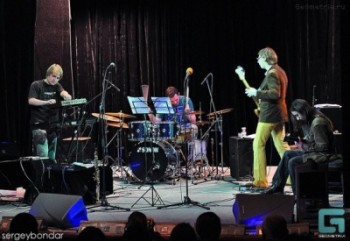 Vespero (Astrakhan)
Vespero (Astrakhan)
Frequent collaborations with other performers help Vespero to guarantee a thoughtful, intricate modus operandi: “Full of synthesizers and strings, the band's music successfully combines multiple styles with a mysterious, slightly ominous atmosphere. Yet another sphere[!] acknowledged by Vespero is world music; elements of a Near Eastern heritage are relatively prominent, though we're definitely dealing with rock performance.”
“...a mysterious, slightly ominous atmosphere”
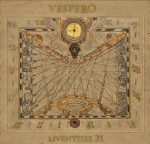 These options, alternatives, and avenues become so numerous that generically recognizable
statements are superseded by some ineffable process. Activity becomes more important than any
fixed, constant assertion. Movement is all. And therein lies the greatest paradox of all, perhaps. It's
precisely because these Slavic – and Armenian – musicians have experienced the
restrictions of unidirectional, even obsessive modernism that they find (or at least imagine) greater
freedom within the ageless habits of older praxis. Custom is liberty.
These options, alternatives, and avenues become so numerous that generically recognizable
statements are superseded by some ineffable process. Activity becomes more important than any
fixed, constant assertion. Movement is all. And therein lies the greatest paradox of all, perhaps. It's
precisely because these Slavic – and Armenian – musicians have experienced the
restrictions of unidirectional, even obsessive modernism that they find (or at least imagine) greater
freedom within the ageless habits of older praxis. Custom is liberty.
Whether we're talking about the dictatorial constraints of Soviet society or the civic disparities of modern-day Russia, a huge romance endures for whatever came before. Thoughts – and dreams – endure of some free, unfettered movement across an open landscape. And, if that still seems insufficient, then musicians such as Ole Lukkoye are willing to lapse into fantasy... and amateur chemistry. The fields and forests offer much more hope than any barricades. They allow for the creation of different timelines and maps – spun from much more vivid colors.
Far From Moscow, October 7, 2011